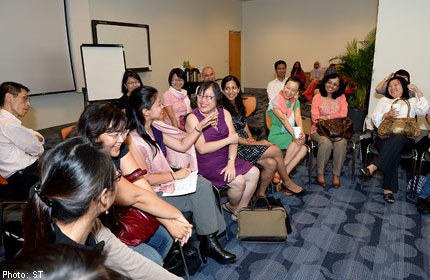
To hear Facebook's chief operating officer Sheryl Sandberg tell it, most women have mediocre careers because they are reluctant to be too confident and ambitious, lest they come off as aggressive and unmarriageable.
Her controversial book on this, Lean In, was the subject of The Straits Times' first Big Read Meet at the National Library Board (NLB) headquarters in Victoria Street last Wednesday.
The event drew more than 40 Straits Times readers from all walks of life.
In Lean In, Ms Sandberg gives working women the following road map to becoming leaders, and not just followers:
fight their fears;
take as many risks and soak up as much experience as they can;
enlist a respected senior colleague as a mentor;
be relentlessly pleasant against all work odds; and find a life partner who will support them on all scores.

Of course, saying is easier than doing, and most of the participants at last week's Big Read Meet hammered home that point well in a lively, well-considered and often impassioned discussion.
Early on, Ms Lynn Huang, 42, senior marketing director of Motorola Solutions, thought most women did not lean in because they feared failure too much. Quoting Ms Sandberg, she challenged participants: "What would you do if you were not afraid?"
Many, including NLB associate Zainap Osman, 43, wished that women in general would simply ask for what they needed or wanted, such as telecommuting; a retired science teacher, in particular, despaired of how her female students always took a back seat to their more curious and actively involved male classmates.
This was after Mrs Shuba Narayanan, 52, managing partner of HR Strategies, pointed out that some societies, especially in Asia, had conditioned women to be second to men so deeply that "they hesitate to put their right foot forward when managing their careers". For example, another participant shared a time when a female colleague on a key project asked for leave to care for her sick child, the participant wondered why the colleague's husband could not take some days off to help care for the kid. The colleague replied that it never occurred to her to ask that of her husband.
One issue that cropped up was men's expectations of women's behaviour at the workplace.
A former compliance officer in a financial advisory firm who requested not to be named, told of how she turned up in a long- sleeved turtleneck sweater for an office party, to make the point that she was "valued for her brain" and not her looks. Her female colleagues seemed comfortable displaying their cleavage because it was considered "part of their office culture". She felt ostracised, and soon left the firm.
Ms Julie Haw, 41, a managing director with a food import company here, had everyone sitting up when she said she would tell new staff not to see her as a "female boss", but just "a boss".
She meant that she wanted to be treated as a male boss would even though she was female: she would be direct and not emotional. She explained later: "I know there are many preconceived ideas men have of prospective female bosses... and am aware that my style would be considered more 'male'.
There are both positive and negative traits associated with female bosses (so) I would rather this issue be addressed upfront and my recruits join me without too many assumptions."
The discussion got especially heated when some readers wondered aloud why women did not bond like men.
Ms Haw thought it was because most were less willing to sacrifice family time for a happy hour drinking with the men.
Then again, some readers noted, it might be better if society stopped seeing work-life struggles as male or female issues, but just dealt with them as general life challenges.
If nothing else, Ms Haw stressed, women should stop expecting everyone else to rewrite the rules of the game to suit their individual circumstances.
Agreeing, Ms Wendy Chua- Sullivan, 43, who used to be a single mother with three children before she remarried, said she coped with being father and mother all at once by being present in every moment and focusing totally on what was to hand. Ms Chua-Sullivan, who is founder of leadership coaching consultancy Wand Inspiration, added that she found strength for all her roles by taking 10 minutes off every few hours to rest, before hurtling off again.
New Zealander and Singapore permanent resident Albert King, 51, who is a divorced father of three and a leadership facilitator, was among the handful of men at the meet last Wednesday. Mr King pointed out there were actually "two games in play" currently: The first was that of working women vying for more senior corporate positions and the second was that of parents trying to shape well their children's mindsets, that is, helping their daughters gain confidence even as they taught their sons that their sisters were equal to them.
That said, Ms Christine Leong, 25, a marketing executive at Epigram Books here, said that neither she nor her peers had ever felt excluded from opportunities their male counterparts enjoyed just because they were women. It helped, she noted, that her parents were supportive of whatever she tried, even in male-dominated arenas.
Madam Alli Rani K. R. Thangavelu, 72, a retired teacher, brought the evening to a meaningful close when she observed that when a tree grows high and strong, nobody notices its "roots" - by roots, she meant women, who anchor society with their many roles.

Get a copy of The Straits Times or go to straitstimes.com for more stories.

